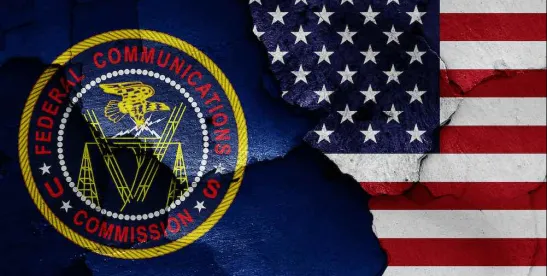The Supreme Court is poised to provide further guidance on the limits of agency rulings. The case is McLaughlin Chiropractic Associates, Inc. v. McKesson Corporation et al., No. 23-1226, and it raises the issue of whether the Hobbs Act required a district court to accept the Federal Communications Commission’s (FCC) interpretation of the TCPA as it pertains to faxes received by email.
At the center of McLaughlin is a 2019 FCC Declaratory Ruling that has derailed several putative TCPA class actions premised on the alleged receipt of faxes.[1] In that ruling, the FCC explained that “an online fax service that effectively receives faxes ‘sent as an email over the Internet’ and is not itself ‘equipment which has the capacity to . . . transcribe text or images (or both) from an electronic signal received over a regular telephone line onto paper’ is not a ‘telephone facsimile machine’ and thus falls outside the scope of the statutory prohibition.”[2] Given the ubiquity of online fax services, the Declaratory Ruling created a substantial merits and class certification hurdle for the plaintiffs’ bar.
In the underlying district court case, for example, the US District Court for the Northern District of California entered an order to show cause and went on to decertify the class.[3] The district court explained, “an FCC decision issued after the class’s initial certification changed the requirements for TCPA liability. There is now no liability under the TCPA for faxes received via an online fax service.”[4] In light of the Declaratory Ruling, the district court concluded that certification was inappropriate given the individualized issues that would have to be teased out to determine who received a fax on a qualifying platform.[5]
The plaintiff did not fare any better on appeal. As we previously reported here, the Ninth Circuit held that the Declaratory Ruling was binding, qualified as a final order under the Hobbs Act, and applied retroactively.[6] It explained:
Under the Hobbs Act, federal courts of appeals have “exclusive jurisdiction to enjoin, set aside, suspend (in whole or in part), or to determine the validity of all final orders of the Federal Communication Commission made reviewable” by 47 U.S.C. § 402(a). 28 U.S.C. § 2342(1) . . . .
. . .
First, it does not matter that [the] Amerifactors [Declaratory Ruling] was issued by the Commission’s Consumer and Governmental Affairs Bureau, rather than the full Commission.
. . .
Second, [the] Amerifactors [Declaratory Ruling] is a “final order” under the Hobbs Act. Orders of the Commission are final for the purposes of the Hobbs Act “if they impose an obligation, deny a right, or fix some legal relationship as a consummation of the administrative process.” . . . [The] Amerifactors [Declaratory Ruling] is a product of the Commission’s administrative process. The Commission . . . received a petition . . . , sought public comment, and issued Amerifactors through its general rulemaking authority to carry out the TCPA. . . . And the ruling fixes a legal relationship by clarifying that an online fax service is not a “telephone facsimile machine” . . . . Thus, [the] Amerifactors [Declaratory Ruling] is final for purposes of the Hobbs Act.
As a final order . . . [the] Amerifactors [Declaratory Ruling] is subject to judicial review as provided by the Hobbs Act. That is, it is reviewable only by the federal courts of appeals. . . . As a result, [it] is binding on the district court.[7]
With that loss in hand, the plaintiff teed up the issue for the Supreme Court as: “Whether the Hobbs Act required the district court in this case to accept the FCC’s legal interpretation of the Telephone Consumer Protection Act.”
McLaughlin comes just a few months after the Supreme Court’s decision in Loper Bright Enterprises v. Raimondo,[8] which struck down Chevron deference and held that courts “must exercise their independent judgment in deciding whether an agency has acted within its statutory authority.”[9] With McLaughlin looming, TCPA litigants (and the FCC) face the possibility of further uncertainty and a revival of TCPA fax cases. Statutory definitions, for example, may be left unclear and become the subject of further debate for years to come (with potentially different outcomes among circuits). Whether or not actively dealing with litigation, businesses active in the faxing space (particularly in the medical fields) would be wise to keep abreast of these developments, which may result in action items for compliance teams and changes in marketing strategies.
Endnotes
[1] In re Amerifactors Financial Group, LLC Petition for Expedited Declaratory Ruling (2019) 34 FCC Rcd 11950.
[2] Id. at ¶ 3.
[3] True Health Chiropractic Inc. v. McKesson Corp., No. 13-cv-02219-HSG, 2021 US Dist. LEXIS 199266, at *1 (N.D. Cal. Oct. 15, 2021).
[4] Id. at *2.
[5] Id. at *4-11.
[6] See True Health Chiropractic, Inc. v. McKesson Corp., Nos. 22-15710 and 22-15732, 2023 US App. LEXIS 28346 (9th Cir. Oct. 25, 2023).
[7] Id. at *5-6.
[8] Loper Bright Enters. v. Raimondo, 144 S. Ct. 2244 (2024).
[9] Id. at 2273.






 />i
/>i

